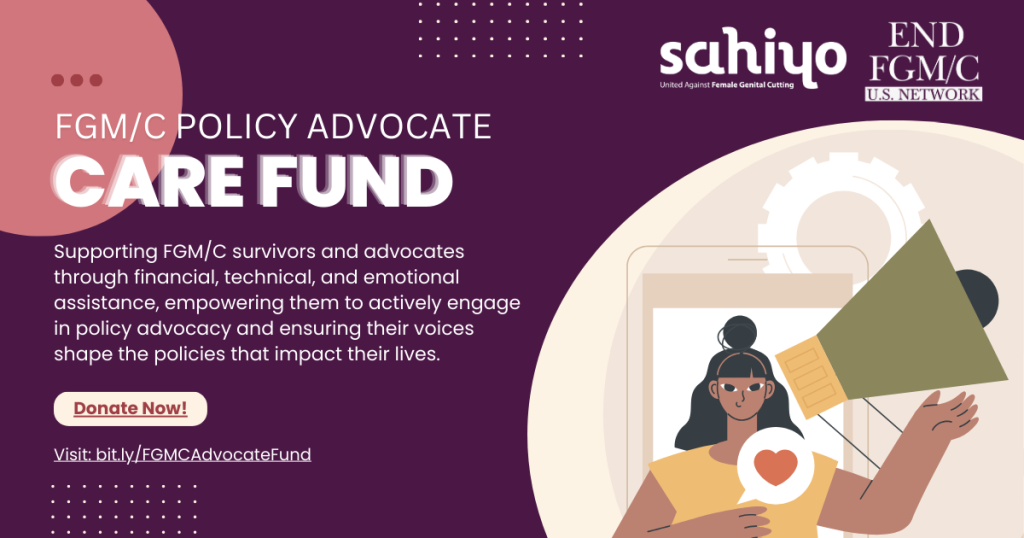Help a Change Maker Through the FGM/C Policy Advocate Care Fund

In late 2025, Sahiyo introduced The FGM/C Policy Advocate Care Fund, a partnership between Sahiyo and The U.S. End FGM/C Network. This fund was created to provide resources to the incredible advocates and activists working to end this harmful practice and support survivors of FGM/C. The goals of this fund are as follows: Empower survivors and individuals from communities impacted by female genital mutilation/cutting (FGM/C) Enable survivors, activists, and advocates to actively engage in education and policy advocacy Ensure that activists are fairly compensated for their contributions, recognizing that they are often overlooked and underfunded The advocates and activists who support the movement to end FGM/C work tirelessly and often face numerous challenges with a lack of resources. That is why this fund is so important. Below, our incredible policy intern Sara Khattak explains why the fund is needed, how it will support both survivors and advocates and how the resources provided by this fund are crucial to help pass more legislation on FGC. “Help a change maker, FGM/C affects millions worldwide and over 500,000 people in the U.S. Policy advocacy is crucial for change especially in the nine U.S. states still lacking FGM/C legislation. The FGM/C Policy Advocate Care Fund empowers survivors and advocates to lead the charge and make lasting change.” [youtube url=”https://www.youtube.com/watch?v=5-CxnR5xkwk”] If you want to help the movement to end FGM/C, then there is no better way to do it than by donating to The FGM/C Policy Advocate Care Fund. Donate today!
Uniting to End FGM/C Across the Americas: A Joint Statement

This February 6th – International Day of Zero Tolerance for Female Genital Mutilation/Cutting, in recognition of this year’s theme – “Stepping Up the Pace. Strengthening Alliances and Building Movements to End FGM,” we are delighted to announce the formation of the Americas Alliance to End FGM/C. The Americas Alliance will serve as a coalition of organizations, governments, researchers, activists, and survivor advocacy groups, dedicated to ending female genital mutilation/cutting (FGM/C) across the Americas. Recognizing FGM/C as a severe violation of human rights and a form of gender-based violence (GBV), the Alliance aims to unify efforts to support survivors, enhance prevention strategies, and promote gender equality throughout the region. FGM/C impacts communities worldwide, including across North and South America, though misconceptions lead to falsely believing the Americas are immune from this form of gender-based violence. The latest data shows us that there may be over 700,000 women and girls across the United States and Canada affected by or at risk of FGM/C. FGM/C also continues to be reported in Colombia, where a bill has recently been introduced to combat the harmful practice. There is also historical evidence of FGM/C being practiced in Mexico, Brazil and Peru which requires further investigation to determine current practice. From survivors living with its physical and psychological consequences to girls at risk, FGM/C transcends borders and cultures, demanding a unified, coordinated, and survivor-centered response.1 Recognizing this need, we are proud to support the creation of the Americas Alliance —a collaborative network dedicated to addressing FGM/C through cross-border cooperation, shared knowledge and resources, and survivor-informed approaches. By bringing diverse voices and expertise together, the Americas Alliance aims to build capacity, amplify advocacy, and create lasting change. Participants: The founding organizations of the Americas Alliance include The U.S. End FGM/C Network, the End FGM Canada Network, George Washington University, Equality Now, and Sahiyo U.S. The Americas Alliance will also involve additional diverse groups of stakeholders dedicated to ending FGM/C and supporting survivors across the Americas. The partners whom the Alliance will collaborate and engage with will include: Service-providing organizationsExamples: Grassroots NGOs, community health organizations, and social service providers working directly with FGM/C survivors. Government representativesExamples: Government and intergovernmental development agencies and departments. ResearchersExamples: Academic institutions, public health researchers, gender studies scholars, and independent experts focused on FGM/C. ActivistsExamples: Survivor-led advocacy groups, grassroots organizers, human rights defenders, and gender justice advocates. And moreExamples: International organizations, private sector partners, legal advocates, faith-based organizations. Our Shared Commitment As participants of the Americas Alliance, we are dedicated to: Enhance data collection and knowledge sharing by establishing a robust framework for collecting and sharing data across countries, improving the accuracy of FGM/C prevalence estimates, and understanding its impact throughout the Americas. Develop trauma-informed, culturally sensitive support systems by facilitating the creation of transnational support networks that are responsive to the cultural and holistic health needs of survivors. Strengthen prevention strategies and policy frameworks by promoting the exchange of best practices and successful prevention models from diverse contexts within the Americas. Coordinate consistent, survivor-centered communications by ensuring that messaging and communications around FGM/C align across the region, maintaining accuracy, and respect for the lived experiences of survivors. If you wish to learn more about the Americas Alliance to End FGM/C, please contact us at americasalliance@endfgmnetwork.org. 1 Efforts are aligned with key Sustainable Development Goals (SDGs), including SDG 3 (Good Health and Well-being), SDG 5 (Gender Equality), and SDG 17 (Global Partnerships).
